Scouting Mika Biereth
By request, here’s an in-depth look into the game of the young Arsenal striker, who has been on fire while on loan in Scotland and Austria. How does he play? What is his potential? What's next?
Loans are a fickle beast.
They require three parties reaching consensus: the player, team A, and team B. Surrounding each is a labyrinth of other parties, all with their own vested interests, whispering in the ear of anyone who will listen.
There are “primary” considerations driving the decision, like play-style, league quality, and the availability of minutes, but the deals often swing on the most practical of matters. Relationships, finance, paperwork, visas, and, you know, whether a player wants to live in their new city.
Digital marketplaces like TransferRoom are emerging to augment the process, enabling teams to post players and loan requirements and expand the list of possible suitors. The ultimate goal of all loaning clubs is to ensure their players get enough minutes at the appropriate level. I’d argue that the reliable delivery of minutes is as valuable as other, more ballyhooed skillsets to a club, whether that be pure talent ID or building the perfect data model. Operations like Brighton use a straightforward competence to usher players up a “staircase” of development. Players grow more quickly, their values rise, and more information is gleaned. Potential signings make note of these case studies. If they are compelling, they sign up.
The complexity of it all is noticed and valued by those in charge, who have all been bitten by bad experiences.
Ben Knapper spent 14 years at Arsenal, climbing his own staircase to the role of loan and pathway manager. He presided over two of the most value-increasing loans in recent memory — William Saliba and Folarin Balogun— and Albert Sambi Lokonga seems to be another nice example. He also accumulated a few counter-examples along the way, as anyone would in that role. Before leaving to be named the sporting director at Norwich City — again, this skillset is valued — he shared what he enjoyed so much about what he did.
“It sits between the Academy and first team, so it gives me that good perspective of all the talent we have in the organisation," Knapper said. “That variety is what I really like. I see it very much as like a mini Sporting Directorship, really — managing a small stable of players and leading on all aspects of them, whether it be a football aspect, an economic or financial aspect.”
Make no mistake. The whole enterprise is still a crapshoot. After the actual loan, variables sprout up like weeds. Managers get sacked, teams struggle, injuries happen, play-styles change, young players do young player things, and impatience often wins the day. Charlie Patino is on his sixth manager in two years, not including Mr. Arteta. Andrey Santos played 8 total minutes during his loan to Nottingham Forest. Armando Broja is up to 51 at Fulham. The receiving club invariably cares more about the accumulation of points than the development and livelihood of a tourist. The loaning club wishes they’d care about the opposite, and may even hit the “redo” button in the middle of a season.
Jimi Hendrix taught us about “Castles Made of Sand.”
Because of this, I usually try to expect these ups and downs as a matter of course, and tune out from the weekly updates of loanees, stubbornly deferring to the long view.
Sometimes, though, a player forces the issue.
🔥 Background
Mika Biereth was born in London to a Danish-German father and a Bosnian mother, and now represents the Danes at a u21 level — a squad with some nice talent, by the way.
In England, his path initially crossed with somebody you may have heard of.
“Jamal Musiala is my best friend,” said Biereth to Tipsbladet. “We grew up together and went to school together. I played with him at Chelsea. He really is like a brother to me and we are in touch every single day.”
“I actually spoke to him 10 minutes before this interview,” he continued. “Our relationship is not so much about football. Of course we talk about football and support each other, but most of the time we talk about everything else.”
While much ink has been spilled about Musiala’s decision to leave Chelsea for Germany at the age of 16, I haven’t successfully dug up any information about Biereth’s time in the youth ranks at Cobham, apart from this mention, and I like to think of myself as a high-tier Googler. While you ponder whether we have one more Declan Rice-style cast-off on our hands, there is much to glean from Biereth’s time in Motspur Park.
The Fulham Academy has a long list of impressive products — think Carvalho, the Sessegnon brothers, Harvey Elliott, and Moussa Dembélé — oh, and I also like Matt O’Riley from Celtic — and they are comfortable targeting players with the highest aspirations.
“We absolutely want the best,” said Huw Jennings, Fulham’s Head of Football Development. “When players come and join us, we say, ‘Look at some point, we would be delighted for you to go and play for Real Madrid and win the Champions League. If that’s your ambition’. We encourage our players to have the highest level of ambition possible.”
En route to a second-straight capture of the u18 Premier League South, Biereth did a madness. I mean, look at this.
His six goal involvements against Leicester u18 in a single match in 2021? That’s the same as Trent Alexander-Arnold’s tally for this entire year. You tell me who the better player is.
His tape from this period shows a player using some straightforward physical advantages and a mature grasp of the game to relentlessly create opportunities for his side. He played older and readier than his markers.
His performance earned his first professional contract, and it’s where our story really begins.
➡️ On to Arsenal
Arsenal swooped him up in July 2021, and the aforementioned pathway weighed heavily in his decision.
As he told the Arsenal site: “With the recent track record of youth going into the first team, I thought it was a great project to try and be a part of.”
After he signed, right on cue, the first competitive fixture of the senior team would feature a COVID-stricken Arsenal including the likes of Folarin Balogun, Emile Smith Rowe, Gabriel Martinelli, and Bukayo Saka.
He recalled his own “welcome to Arsenal” moment to Art de Roché of The Athletic.
“I was with them for one of the first sessions and I was pinning ‘Big Gabi’ (centre-back Gabriel),” he recalls with a chuckle. “I’d been pinning 18-year-olds at Fulham, which wasn’t that hard. And then I came to ‘Big Gabi’ who’s crunching from behind, so it’s completely different.”
His first year in the Premier League 2 was a successful one. He started off in an interesting strike partnership with Balogun, before Flo secured a loan of his own. Biereth went on to lead the line and accumulate 11 goals and 4 assists. In that same interview, he recalled some of his other learnings.
“(First-team manager) Mikel Arteta likes the striker to play in the No 10 pocket, so it’s just about adding those little things. Becoming comfortable dropping into that space where midfielders open it up for you, which we didn’t really do at Fulham.
“At Fulham in my two years as a scholar, we played a 4-4-2 with a diamond. We didn’t play (intricate) football as much — it was more channel balls and fighting (for the ball). At Arsenal, it’s a different style.”
And that’s when the loan monster bit. He had one of those.
A trip to the Eredivisie made a lot of sense on paper. He was signed by Waalwijk, and made a great first impression by scoring five goals in his first four pre-season games. Unfortunately from there, he was tailed by the injury bug for the first time in his career. He wound up only lining up two starts on the season. He’s missed four spells in his career thus far, which is not enough to be too concerned, but not enough to ignore.
His next step had to work out. It did.
Joining Motherwell in Scotland, he made another tidy first impression, picking up a goal and assist in his debut before missing the spell you see above. From there, it was accelerator to the floor. He nabbed 11 G+A in 11 total starts, playing alone and in a front-two, and doing a lot of Fulham-style channel runs to create chances.
It may have even gone too well for Motherwell, as Arsenal made the contentious decision to recall him from the loan and send him to Austria. Motherwell manager Stuart Kettlewell felt how you may imagine.
“It’s been a difficult one for us over the last 24 hours. Arsenal have called him back. It’s a major, major disappointment to us of course,” Kettlewell said. “They feel that he’s been in a terrific position. They’ve loved the working environment here … There’s a situation there that’s completely out of our hands that they believe that there’s an opportunity to send him to another club that takes him that step beyond where we are just now. My hands are tied on that, it’s a major disappointment on that one for me.”
This brings us to today.
Biereth has, again, made a terrific first impression. Moving to Sturm Graz in Austria, he’s scored 8 times in his first 11 appearances, adding an assist. This total includes a goal in the Austrian Cup and three in his first taste of European competition.
🔴 Overview
By joining Sturm Graz, Biereth is taking a shift at the striker factory. In 21/22, the club sold Kelvin Yeobah to Genoa for €6.5m. In 22/23, it was Rasmus Højlund’s turn, with Atalanta coming in for €20m. Last year, striker Emanuel Emegha went to Strasbourg for €13m. They wanted Biereth on a permanent.
“He [Andreas Schicker, Sturm Graz’s sporting director] even said himself that they tried to do a permanent [transfer]. I was open to that as well but Arsenal weren’t looking to allow me to leave … It was kind of simple that I wasn’t for sale in January.”
The Austrian side clearly have an eye for striking talent, and in particular, they seem to target the physical channel runner profile. Their tactical setup allows them to start the attack narrowly, giving their dual-strikers the ability to run and create in equal measure. For somebody like Biereth — who feels half Arsenal, half Fulham in development — this plays to his strengths.
What you’ll see is a lot of wide early build-up formations with tight packs of attackers in the middle; I’d say a 4-3-1-2 is the formation I’ve seen the most.
Against Red Bull Salzburg, you’ll see a narrower 4-2-2-2. Generally, the ball-side striker is, essentially, the winger — galloping the channels and playmaking from wide areas. The other striker then runs through the middle and crashes the box.
They can also attack with one up top.
The club is on its way to its third-straight second-place finish in the Austrian Bundesliga. They score a lot (second-highest in the league) and press pretty high (8.32 PPDA). They are not purely possession-conscious and are happy to ping it long and try to score goals. They exploit the margins to rack ‘em up: lots of goals from headers, corners, and the like. Energy is prized.
This has all suited Biereth.
📈 Areas of emphasis
To help understand him best as a player, I speed-ran seven of his games, one at each level he’s played, and three at Sturm Graz. I then watched every goal and assist he’s ever scored, a curated playlist of other plays (good and bad) from throughout his career, and whatever else I could get my hands on. I can’t profess to have a whole picture, so there are gaps.
But here’s a start.
👉 Balance and strength
Two of Biereth’s underlying standout qualities are his work-rate and balance. He is always “on,” never looks tired, and is usually the one to initiate the contact with the defender. He welcomes physical battles and naturally enjoys the fight for position. He can be seen employing every trick in the book: subtle leans, hand jabs, and full shoves to get the defender off-balance.
He is listed at 6-2’ and is strong but not necessarily on the fully athletically domineering, Ivan Drago-ish level of a Højlund or Haaland. He has played like that in Scotland and Austria, however — channel-running into space like a Michail Antonio, shoving the marker off the ball, and then looking up to make something happen. It’s fair to consider how much he’ll be able to bully as he continues to progress up the ladder; he made less of an impression against Leny Yoro and Alexsandro of Lille.
This balance is an asset at the “top of the key,” when he receives the ball with his back to goal in “Zone 14” on the edge of the box. He’s had flashes in hold-up play, particularly when he was at Arsenal, but I haven’t seen quite as much lately, and he probably has some untapped potential there. It’s just hard to push him off.
👉 Ball-striking and composure
His other noticeable quality is the most basic one: he scores goals. He has a goal involvement in every 90 minutes of the career we have access to. It comes out to 53 goals and 23 assists in 7,134 minutes.
He does this through a mix of savvy, poaching, relentlessness, and composure. He’s always played like he’s older than he is, and especially in the youth ranks, it just always felt like had more subtle tricks up his sleeve to get a goal in.
I saw few, if any, worldies in his tape (OK, there was a nice one for Motherwell). There’s a lot of stuff like this — where he fights for balance, gets a touch before a defender, and then just slots it home at the right speed.
There’s also a lot of this. He “comes alive” at the right moment and understands just how to tap it in.
This is where he makes his own comparisons. He’s an insightful, funny interview, by the way.
“I’ve said before if I can compare myself to another player I’d say a shit Haaland and a shit Kane! A hybrid of them at a much worse level,” said Biereth. “Like Haaland, all I really care about is scoring goals. If you’d offer me two touches of the ball and two goals I’d take that. For me, it’s all about scoring goals.”
He is not rushed, but there is very little deliberation or second-guessing once the ball comes to him. It’s always just a bang-bang decision and an immediate shot, with minimal waste in his actions, which helps in crowded boxes. I’d say one of the more intriguing finishes of late was this one, because it showed a different technique.
His left foot isn’t a huge strength or a weakness; he uses it when he needs to.
But how many shots can he create for himself?
👉 Movement
As we’ve covered, he’s adept at all the poachery movement stuff. Another thing in his bag is just ghosting in the blind-side of the defender on long-balls.
I’m admittedly showing this one to include Balogun’s pass as much as Biereth’s finish.
There’s also the wide channel running, in which he sprints into the corner at the right speed, gaining a step on the CB as he sets up his play.
Also: here, you can see him splitting defenders in the Netherlands.
Otherwise, though, I think this tends to be his biggest area of achievable improvement. He’s been able to physically beat so many CBs over his career, but I don’t see enough subtle nous in his movements to consistently generate separation and create the moment, instead of reacting to it. It’s a little too responsive: he pins a CB on the shoulder for the game, and then looks for something to happen; when it does, he bursts alive and goes for a goal. This can lead to minimal-touch, minimal-involvement games. There’s a flip-side to always wanting to start contact with the defender: they’ll always know where you are.
I pulled the stats since July (which includes Biereth’s time at both Motherwell and Sturm Graz). All caveats apply: the current Arsenal players are doing this in the hardest circumstance (by far), and there’s also the difference in age. But you can get a sense of his style here.
In all, his underlying stats really do share a lot in common with Haaland in many ways — low touch, not especially dribbly, and ruthless in front of goal.
But the two differ in a pivotal way. Biereth does not generate enough shots for himself, at least not yet, and aside from finishing chances, that may be the single most important “underlying” quality of a striker.
As we did in our Osimhen scouting report, we’ll refer to the work of Dr. Ian Graham, who outlined his thoughts on the matter.
“People don't like the theory that the best players win the game," Graham said. “People love to mystify that there has to be some magic about football that's not easy to measure. A scout or a coach would say, "Why do we like this forward?" His team would respond, "He takes loads of really good shots." The scout or coach would counter, "Yeah, but does he drive inside enough? Does he bring his teammates into play enough?"
"But we're playing them up front," Graham said. "He takes loads of good quality shots. There is literally nothing else to say. All other arguments, they're second-order effects compared to this. But people love to mystify and bring more and more factors into play. A use of the data is just to say: This is the important thing and we might be wrong about it -- we sometimes are wrong -- but you have to come up with some really good arguments against this one really important thing."
Biereth has so far compensated by being otherworldy-efficient in front of goal. He’s converting 43% of his shots into goals; that’s about double the rate of Haaland, and around 3x the rate of the likes of Havertz, Jesus, and Nketiah.
Do I think he is actually cold-blooded in front of goal? I do. Do I expect the current fishing rate to be sustainable? I don’t.
👉 Link-up and creation
This is a small sample, but you can see how little he’s generally involved in the on-ball play. This is where he’s playing a bit like an Michail Antonio of the league (Michail Austria?) — he pins, then sprints, then muscles, then tries to make something happen.
This is a very small sample size, so take it as you will. It’s also important to reinforce that this is the role that is being asked of him, moreso than a declaration of quality.
In general, I think there’s a nice amount of potential here. He’s got a reliable method for chance creation. When he receives the ball on the wing, he can carry it with pretty nice pace, and then get his head up as he sprints to the byline, picking out runners. I’ve seen more than a couple of these cut-backs get hit.
Again, you’ll see that he has a good, inherent sense of the players around him.
And I think the below clip will give you a good sense of him. Breaking out on a post-corner transition, he sprints forward. His power-carrying isn’t the most crisp but it’s usually effective enough for the current level, but he’s really great at lifting his head up at the right time and picking out runners. The touch on this pass was perfect and could have led to a goal.
His strength, balance, and ability to pick out a pass means there’s a solid foundation for a hold-up forward here — in addition to the pure striker he usually is.
👉 Dribbling and carrying
His body is pretty ramrod-straight when carrying — he doesn’t have the wiggly hips of a winger — so he is less of a true dribbler than a power-carrier. He has good, composed tight-space touches in the box, but I haven’t seen him beat his man with a lot of slick moves in open play. He’s often just trying to get into the corner and find leverage.
👉 Pure speed, aerial work, and physical gifts
Here is where the entire delta for Biereth lies: how fast is he, really? How strong is he really? Are these talents up to snuff of a Premier League striker?
Below is one of the Motherwell goals — another one of his trademark debuts — that made the rounds. It gives you a really good sense of him.
He’s sprinting through the middle against Will Fish, a Manchester United loanee who is not without size or talent. The ball tails away, and Fish ultimately gets a step on him. But Biereth is relentless, using his hands to shove keep Fish off-balance; Fish is then put in a blender, and makes a mess of it. Biereth uncharacteristically takes an extra chop or two and nets it near-post.
But however likable that goal is, that initial burst is just worth considering as we look to project him to the next step. Here, in the Europa Conference League, you see him running against Guram Kashia — a 35-year-old defender from the Slovak Super Liga. You can’t expect him to win every battle, but would still love to see him just look completely athletically overpowering on a run like this.
His runs and endurance are, in general, a strength. He sprints after lost causes, and isn’t slow by any means. I’d project him to be additive in the press and in a block.
Aerially, he’s fairly tall though not aerially dominant, and his aerial win-rate (while not the best stat) is meager. As a departure from the rest of his game, he can sometimes look to play the ball instead of securing position first. That can come with time.
He is good at getting his head on the ball on the far-post and putting it back into the mixer.
🔥 In conclusion
There’s reason to feel hopeful about Biereth’s future. That reason is simple — whenever he plays a consistent run of games, at whatever level, he tends to rack up goals.
In that same screen, you’ll also see a bit of a counterargument: that’s not a lot of shots for that many goals. Is that sustainable?
There is a bigger question looming in the minds of Arsenal fans, however. That question is this: could Biereth force his way into the plans of his senior club?
To better investigate that query, we can turn back to BEAST — which was our model for projecting the best striker signings for Arsenal. The scales were tipped to the athletic demons, and I sought to explain why.
The Saliba example points to something informative about a possible search for a new forward. In 2024, centre-backs are absurdly gifted — giant, fast, strong, and technical. For fans of basketball, I’ve likened it to the evolution of the NBA, in which a generation of enormous people have been taught since birth that they are not just bullying brutes — they can take the ball down the floor and do the fun stuff, too. It’s led to a cabal of players who are just as “technical” as their brethren, but way bigger.
With the Premier League becoming the Super League, more of these centre-backing aliens are headed to England. As such, it’s hard to find an advantage as an attacker. Physical battles become paramount, especially on a top squad. I’ll explain.
When games are more open, a little bit of savvy goes a long way. If you beat your defender by a step when running the channels, that may translate to a yard or two of space over that distance, which is all that may be necessary for a goal.
[…]
But from the mid-table on up, it gets difficult for top sides.
[…]
It was moments like this that led Manchester City to seek Erling Haaland and Liverpool to sign Darwin Núñez. In these situations, you can be as tricky as you want, but it’s nice to have two things: killer balls and clear mismatches. The latter category may incorporate height, strength, and leaping — but it may also just include elite burst and decisive finishing ability.
The TL;DR is this: once a team like Arsenal establishes themselves as a dominant force, their strikers get two kinds of matchups. Mid-to-lower-table opponents will settle in mid-to-lower blocks, so space is at a premium. Higher-level opponents have freaks like Virgil van Dijk. In either case, savvy is not enough — physical advantages win the day.
As I took notes on Biereth, there were five players who came to mind: Santiago Giménez, Mehdi Taremi, Viktor Gyökeres, Vangelis Pavlidis, and Rasmus Højlund. These are five players who are direct, goal-hungry, and unwasteful with their chances.
Like those five — specifically, the first four — I can readily picture a next step in which Biereth racks up goals while bullying centre-backs in a league like the Eredivisie, Primeira Liga (Portugal), or perhaps France/Germany. I’m also always partial to developing attackers in Belgium, but that may be too lateral of a step at this stage. The Championship may be the best test of his physical levels.
This all makes him attractive to potential suitors. My impulse is to shepherd that move with a loan next year, and then survey the sale market from there. Honestly, it feels like a pretty straightforward decision, unless somebody comes with a big bag this summer.
[Edit: Maybe not so. Thanks to Jack for pointing out that Biereth’s contract will have one year left this summer, which may complicate the picture. Will he extend his contract to facilitate a loan, or push for a permanent move now?]
Overall, my gut is that his strength can generally translate to the top-5 leagues, though the advantage will lessen, and it may take some time. His burst will face a much stiffer exam, and without the advantage there that a Højlund may bring, he’ll have to round out other parts of his game — back-to-goal stuff, subtler off-ball movements, aerial work. In general, his biggest area of improvement is simply creating more shots for himself. This is not beyond the question. Young players are not static. They evolve and grow.
For the foreseeable future, though, Arsenal will be at the absolute highest bar, and it will be a difficult one for aspirants to reach, especially with reports of the club entering the striker market in the summer. The odds are certainly against him.
As I found throughout the process of writing this, the most clear-headed analysis of Biereth may come from the player himself.
“It’s difficult to get into that first team at Arsenal,” he said before his move to Austria. “At any of the really big clubs in the world, if they don’t have a player for a certain position they can go and spend £100m for one. So, it’s not a failure if you don’t make it at Arsenal. Of course, my number one objective is to get into their first team. But maybe I’ll get a move somewhere else, whether that’s another loan or permanent. Going to a level below at 20 years old wouldn’t be a massive failure. Folarin [Balogun] had to move on. He’s 22 but we played together for the Under-21s at Arsenal.”
He added:
“However, I have to believe I can get into that team. Why wouldn’t I? You always have to believe in your ability.”


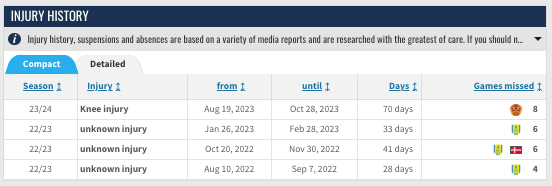





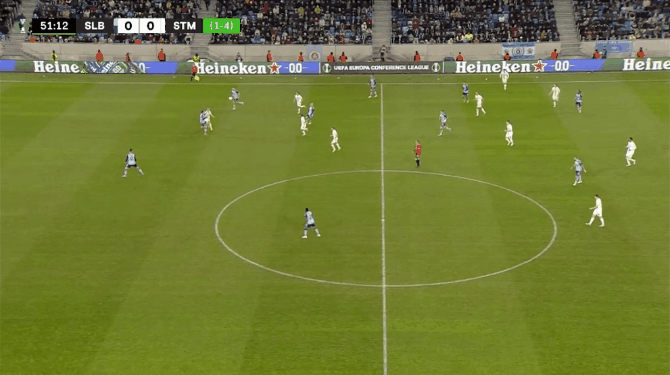
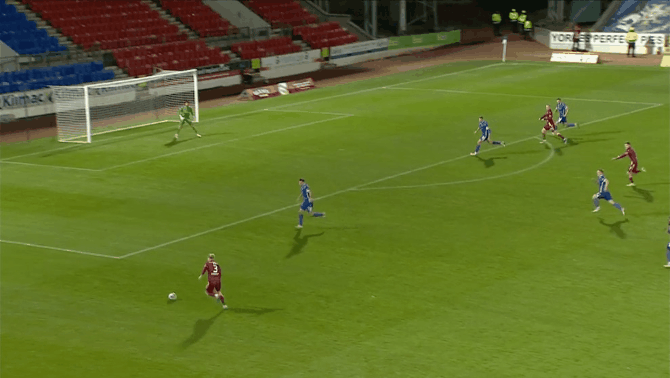
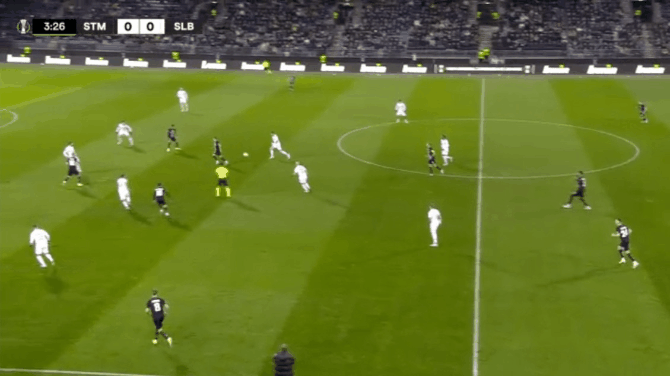

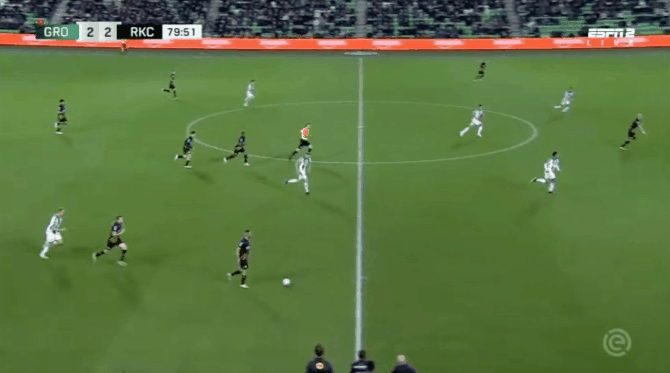



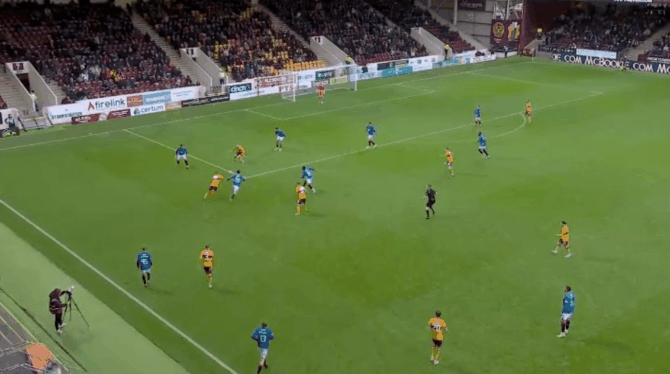

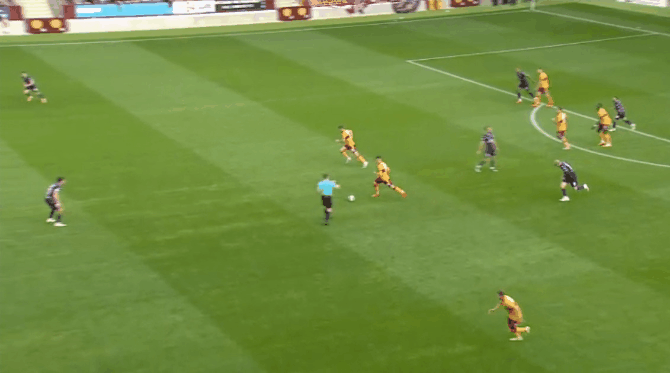
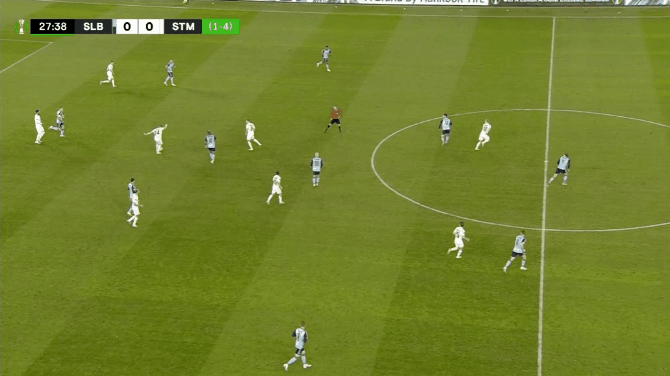

Great piece Billy - recognizing and celebrating his achievements thus far but also not overhyping him to be the next big thing and putting unnecessary spotlight/pressure on him.
When it comes to scouting the BEAST striker - I think it's always difficult to assess how the striker will translate his physicality and speed in different leagues - which makes a high profile transfer of that sort of striker all the more riskier.
I am glad you gave Biereth a comparison to Viktor Gyökeres - whom is heavily linked with us (along with almost every other big club in Europe needing a striker) per Ornstein.
I am personally working on a substack piece myself of Viktor Gyökeres - but am keen to know your initial impressions of him?
Cheers Billy.
Great stuff Billy! Glad you managed to get round to giving a little time to a prospect that has gone under the radar until very recently.
I think he's probably at least 18 months from being anywhere near the Arsenal first team but my eyebrows did raise slightly when I heard he was off to Sturm Graz, they've positioned themselves nicely in Austria as an up and coming talent factory. The promising thing, for me at least, is that he has delivered and improved at every level he has played at since his arrival at Arsenal. Hopefully that continues.
Cheers as always!